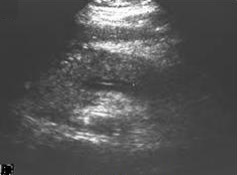Acute pancreatitis
| Acute pancreatitis | |
|---|---|

| |
| Synonyms | N/A |
| Pronounce | N/A |
| Specialty | N/A |
| Symptoms | Abdominal pain, nausea, vomiting, fever |
| Complications | Pancreatic necrosis, pseudocyst, organ failure |
| Onset | Sudden |
| Duration | Days to weeks |
| Types | N/A |
| Causes | Gallstones, alcohol consumption, hypertriglyceridemia, trauma |
| Risks | Smoking, obesity, genetic predisposition |
| Diagnosis | Blood tests, imaging studies (CT scan, ultrasound) |
| Differential diagnosis | Peptic ulcer disease, cholecystitis, myocardial infarction |
| Prevention | N/A |
| Treatment | Intravenous fluids, pain management, nutritional support |
| Medication | Analgesics, antibiotics (if infected) |
| Prognosis | Generally good with treatment, but can be severe |
| Frequency | 5 to 80 per 100,000 people per year |
| Deaths | 1.6 per 100,000 people per year |
== Acute Pancreatitis ==
Acute pancreatitis is a sudden inflammation of the pancreas. It can be a mild, self-limiting condition or a severe, life-threatening illness. The pancreas is an organ located behind the stomach that plays a crucial role in digestion and blood sugar regulation.
Pathophysiology[edit | edit source]
Acute pancreatitis occurs when digestive enzymes produced by the pancreas become activated while still inside the organ, leading to autodigestion of pancreatic tissue. This process results in inflammation, edema, and in severe cases, necrosis of the pancreatic tissue. The release of these enzymes and inflammatory mediators can also affect other organs, leading to systemic complications.
Causes[edit | edit source]
The most common causes of acute pancreatitis include:
- Gallstones: These can block the bile duct, leading to pancreatic inflammation.
- Alcohol consumption: Heavy alcohol use is a significant risk factor.
- Hypertriglyceridemia: Elevated levels of triglycerides in the blood can precipitate pancreatitis.
- Medications: Certain drugs can induce pancreatitis as a side effect.
- Infections: Viral infections such as mumps can lead to pancreatitis.
Symptoms[edit | edit source]
The primary symptom of acute pancreatitis is severe abdominal pain, often described as a constant, dull, and boring pain that radiates to the back. Other symptoms may include:
- Nausea and vomiting
- Fever
- Tachycardia
- Abdominal tenderness
Diagnosis[edit | edit source]
Diagnosis of acute pancreatitis is based on clinical presentation, laboratory tests, and imaging studies. Key diagnostic criteria include:
- Elevated serum amylase and lipase levels
- Imaging studies such as CT scan or ultrasonography
Imaging[edit | edit source]
Imaging plays a crucial role in diagnosing and assessing the severity of acute pancreatitis. A CT scan can reveal pancreatic inflammation, necrosis, and complications such as pseudocysts. Ultrasonography is useful for detecting gallstones and assessing the biliary tree.
Treatment[edit | edit source]
The management of acute pancreatitis involves supportive care, including:
- Fluid resuscitation: To maintain adequate blood volume and prevent shock.
- Pain management: Using analgesics to control abdominal pain.
- Nutritional support: Initially, patients may be kept nil by mouth, with gradual reintroduction of oral intake as tolerated.
- Addressing the underlying cause: Such as removing gallstones or abstaining from alcohol.
Complications[edit | edit source]
Severe acute pancreatitis can lead to complications such as:
- Pancreatic necrosis
- Infection
- Pseudocyst formation
- Systemic inflammatory response syndrome (SIRS)
Prognosis[edit | edit source]
The prognosis of acute pancreatitis varies depending on the severity of the condition and the presence of complications. Mild cases often resolve with supportive care, while severe cases may require intensive medical intervention.
Related pages[edit | edit source]
Gallery[edit | edit source]
Search WikiMD
Ad.Tired of being Overweight? Try W8MD's NYC physician weight loss.
Semaglutide (Ozempic / Wegovy and Tirzepatide (Mounjaro / Zepbound) available. Call 718 946 5500.
Advertise on WikiMD
|
WikiMD's Wellness Encyclopedia |
| Let Food Be Thy Medicine Medicine Thy Food - Hippocrates |
Translate this page: - East Asian
中文,
日本,
한국어,
South Asian
हिन्दी,
தமிழ்,
తెలుగు,
Urdu,
ಕನ್ನಡ,
Southeast Asian
Indonesian,
Vietnamese,
Thai,
မြန်မာဘာသာ,
বাংলা
European
español,
Deutsch,
français,
Greek,
português do Brasil,
polski,
română,
русский,
Nederlands,
norsk,
svenska,
suomi,
Italian
Middle Eastern & African
عربى,
Turkish,
Persian,
Hebrew,
Afrikaans,
isiZulu,
Kiswahili,
Other
Bulgarian,
Hungarian,
Czech,
Swedish,
മലയാളം,
मराठी,
ਪੰਜਾਬੀ,
ગુજરાતી,
Portuguese,
Ukrainian
Medical Disclaimer: WikiMD is not a substitute for professional medical advice. The information on WikiMD is provided as an information resource only, may be incorrect, outdated or misleading, and is not to be used or relied on for any diagnostic or treatment purposes. Please consult your health care provider before making any healthcare decisions or for guidance about a specific medical condition. WikiMD expressly disclaims responsibility, and shall have no liability, for any damages, loss, injury, or liability whatsoever suffered as a result of your reliance on the information contained in this site. By visiting this site you agree to the foregoing terms and conditions, which may from time to time be changed or supplemented by WikiMD. If you do not agree to the foregoing terms and conditions, you should not enter or use this site. See full disclaimer.
Credits:Most images are courtesy of Wikimedia commons, and templates, categories Wikipedia, licensed under CC BY SA or similar.
Contributors: Prab R. Tumpati, MD








